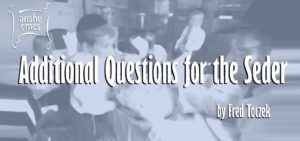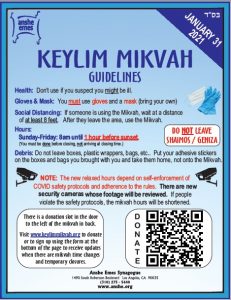 Fred Toczek, author of Anshe Emes’ parsha pages, contributes additional seder questions:
Fred Toczek, author of Anshe Emes’ parsha pages, contributes additional seder questions:
Instructions:
- Most questions may be asked by the leader.
- Highlighted questions may be answered by all present at the seder.
Questions:
- What one goal do you have – what one thing do you want to get out – tonight’s Seder” EVERYONE
- Red wine is preferred at the Seder because of its connotation to blood. What is the connection between blood and Passover?
- At the conclusion of the Kiddush, we make the Sheheyanu blessing (thanking G-d who has given us life, sustained us and brought us to this time). TAKE A MOMENT TO REFLECT ON A PARTICULAR SHEHEYANU MOMENT FROM LAST SEDER TO THIS SEDER EVERYONE
- Why did G-d specifically want the Jewish people to sacrifice the lamb, a g-d to the Egyptians, on the Shabbos preceding the Exodus? Wasn’t this “poking the bear”?
- In what other ways does the number 4 figure into Pesach?
- Normally, women are excempt from time-bound commandments. Why is the Seder an exception? How did women prominently feature in the Pesach story?
- What is the real difference b/t a slave and free person (see R’ Pam, z’tl in Sacks Hagaddah)
- Which ritual of the Seder is the most meaningful to you . . . and why? EVERYONE
- Why is the Exodus so central not only to the Seder but to Jewish thought, ritual and prayer?
- The stated goal of the Seder is for each of us to “personally” experience the Exodus . . . How do you make it relevant to you today? AND/OR what enslaves you and what are you doing/can you do to free yourself? EVERYONE
- Karpas – what do we learn from two opposites (vegetable which represent spring/renewal/growth and salt water which represents suffering)?
- Ha Lachma – why do we wait until the very last minute to invite the poor? And why do we invite them to join us for the “bread of oppression” (can’t we offer a more appetizing menu description)?
- Some say that the “simple” son symbolizes the purest relationship we can have with G-d. How is this so?
- Kabbalah – each of the 4 sons correspond to the 4 parts of the Seder . . . if so, why do we spend the majority of this section devoted to the “wicked son”?
- What does it mean to be a “slave”? Can one be a slave even if he/she isn’t in physical bondage?
- Which “APP” on your phone is the most enslaving and which is the most freeing?
- One the Chassidic masters asks . . . why do we thank G-d for freeing us from slavery when He allowed us to become enslaved in the first place?
- We begin the Passover story with a description of our ancestors as “idol worshippers”. What do we begin with this seemingly disgraceful period of our history?
- The Jerusalem Talmud teaches that G-d personally redeemed the Jewish people (rather than via an angel or other agent). What is the significance of His personal involvement?
- “In every generation” we have edured persectuion . . . some say (and it’s a controversal thought) that persectuion is the ultimate guarantor of Jewish survival. True or false? Why? EVERYONE
- With the founding of the Modern State of Israel, is the story of the Exodus one that is historical only? How does the Modern State of Israel affect the way Jews across the world view threat of persecution?
- Are we more or less free than our parents? Our grandparents? Why?
- Imagine you are rushing out of Egypt and you only have time to grab one thing. What would it be?
- Why was Matza the food of BOTH slavery (the”bread of affliction”) and freedom (Zohar: “the bread of faith”)? What does that teach us?
- Why are we so stringent about Chometz (can’t eat, own, derive benefit, etc.)? What does it symbolize to you?
- How is it fair to punish Pharoh when Hashem “hardened his heart” (was he forced to fail)?
- In what way(s) are our hearts hardened? What can we do to open our hearts?
- Moshe actrually had to sell the idea of “freedom” to the slaves (the vast majority of whom did not elect to leave)? Shouldn’t it have been an easy sell? What do we learn?
- The Talmud (Kiddushin 82b) implies that humans should behave more like animals who act in obedience to their master . . . rather than humans who so often rebel or question His purpose. What trait have you observed in an animal that you would like emulate in your own life?
- Who were the 10 plagues really for – the Egyptians or the Jews? Or both?
- Hallel – why do we praise G-d when He doesn’t “need it”? Is it for us and, if so, in what way?
- Why do we open the door for Eliayu (the harbinger of the Messiah and final redemption). Particularly if we learn that Eliyau can enter each Seder on this night, he shoudln’t require that we physically open the door, no?
- What is the biggest threat facing the Jewish people tdoay? Is it physical or spiritual? What step(s) can we take to combat same?
- Dayenu – make it personal – for what do you have to be thankful? EVERYONE
- What does the Afikomen teach us that warrants it being the “last taste”?



 Visit the group and request to join.
Visit the group and request to join.
